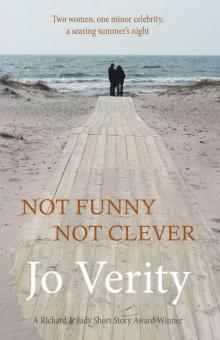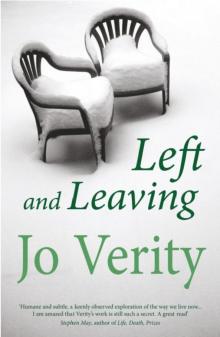Not Funny Not Clever Read online
Praise for Jo Verity’s novels
“A ripping yarn… pitch perfect evocation of childhood and sibling relationships.”
Marcel Theroux, Daily Telegraph
“An exceptionally well-written book… a cracking good read.”
dovegreyreader.co.uk
“A richly detailed and absorbing narrative journey in the company of two completely believable – and believably complicated – characters.”
Andrew Cowan
“A wonderfully wise portrayal of intriguingly troubled lives.”
Suzannah Dunn
“A vivid portrayal of a family scarred by loss.”
Louise Wener
“Verity’s fiction is intelligent, well-observed, and immensely readable.”
Catherine Merriman
“Sweets from Morocco is a highly readable and sophisticated example of storytelling.”
Louise Walsh
NOT FUNNY – NOT CLEVER
by
Jo Verity
HONNO MODERN FICTION
For Lucy and Hannah
Contents
Praise
Title Page
Dedication
Acknowledgements
1: SATURDAY: 9.55AM
2: SATURDAY: 5.50PM
3: SATURDAY: 7.05PM
4: SUNDAY: 2.30AM
5: SUNDAY: 1.45PM
6: SUNDAY: 4.05PM
7: SUNDAY: 5PM
8: MONDAY: 9.30AM
9: MONDAY: 1.35PM
10: MONDAY: 6.55PM
11: TUESDAY: 1.40AM
12: TUESDAY: 3.05AM
13: TUESDAY: 1.10PM
14: TUESDAY: 7.50PM
15: WEDNESDAY: 9.40AM
16: WEDNESDAY: 1.15PM
17: WEDNESDAY: 5.50PM
18: THURSDAY: 12.27AM
19: THURSDAY: 4.00AM
20: THURSDAY: 10.35AM
21: THURSDAY: 2.20PM
22: THURSDAY: 4.25PM
23: THURSDAY: 9.50PM
24: FRIDAY: 6.45AM
25: FRIDAY: 11.30AM
26: FRIDAY: 2.40PM
27: FRIDAY: 7.05PM
28: FRIDAY: 8.35PM
29: SATURDAY: 7.05AM
30: SATURDAY: 10.15AM
31: SATURDAY: 3.20PM
32: SUNDAY: 9.30AM
Advertisement
About the Author
Also by Jo Verity and available from Honno
Copyright
Acknowledgements
My thanks go to the Welsh Books Council and to Honno for their continuing support. Special thanks to my awesome editor, Caroline Oakley, for her sensitive yet determined efforts to make this a better book. Most importantly, thanks to Jim, my wise, patient sounding-board.
Apology
In writing Not Funny – Not Clever I may have tinkered with the topography of Llangennith and the Gower peninsula. I hope those of you who know and love the area will forgive me.
1
SATURDAY: 9.55AM
Elizabeth began piling things on the bed.
Trousers. Short-sleeved shirts. A thin sweater. Toiletries. A couple of novels. (She and Diane had plenty of catching up to do but Di could sometimes be demanding and she might be glad to tune out for an hour or two.)
Catching a glimpse of herself in the mirror on the wardrobe door, she paused to take stock. Whenever she looked in a mirror she was vaguely disappointed by what she saw. When she was six, she’d studied her reflection every morning, hoping that today was the day when Pippi Longstocking would be grinning back at her. But it was always the same gap-toothed girl with straight brown hair; the sort of girl who stood on the periphery of a group, tending to be overlooked when teams were chosen or hands went up to answer a question. As that girl grew up she’d continued peering into mirrors, on the off-chance that Scarlett O’Hara or Elizabeth Bennett or Annie Lennox might greet her. With her fiftieth birthday looming, she’d almost abandoned hope. She was taller than average, big-boned but not
overweight. Her mid-brown hair, cut in a geometric bob – she’d worn it like that since her college days – showed barely a trace of grey. Her face had a generic quality. She knew this to be the case because at least once a week she was mistaken for someone else. Whenever she was on the Tube, she scrutinised the faces of her fellow travellers, wondering whether this might be the day when she encountered herself in the seat opposite. In repose, she looked solemn. (Laurence – probably to boost her morale – said that her face reminded him of an El Greco saint.) When she wasn’t thinking about anything at all, people often asked what was troubling her. She wished she had a fiver for every time she’d heard, ‘Cheer up. It might never happen’. Once, when she was seeking advice on a shade of lipstick, the girl on the Estée Lauder counter had announced cheerfully, ‘I’ve worked out what’s wrong with your face. Your eyes droop down at the corners. Your mouth does too. And actually – don’t take this the wrong way – your nose is a bit … masculine.’ Making sure the girl was watching, she’d bought a preposterously expensive lipstick from the Christian Dior stand nearby.
During the course of the morning, the piles multiplied, spreading across the bedspread like molehills on a perfect lawn. In case Carl had organised tickets for a concert, she dug out a silk shirt, strappy sandals and the pretty beaded bag that Laurence bought her in Italy last year. In case she and Di spent a girlie evening at home, she added a large bar of dark chocolate and a couple of DVDs that she hadn’t got around to watching. What about a swimming costume? She’d only increased one dress size in the twenty-eight years since she was a bride, nevertheless there were bits of her that she wasn’t keen on exposing, even to her closest friends. She left her swimming costume in the drawer.
The phone rang. It was Diane.
‘You are coming, aren’t you?’ she asked.
‘Yes. I’m packing now. What do I need to bring? I’m sure to forget something vital.’
‘Cross-country skis? A thing for getting stones out of horses hooves? A turkey baster?’
Elizabeth smiled, gazing at the bed. ‘Yep. Got ’em all. And a fondue set.’
‘I can’t wait to see you. Carl has some teaching to do. And a few rehearsals. So we’ll have plenty of time to have a proper chat. It’s never the same on the phone.’
‘Everything’s okay, isn’t it?’ Elizabeth asked.
‘Of course. But… you know. And, in honour of your visit, I’ve bought a piece of beef. I shall cook a pukka Sunday dinner. Gravy. Yorkshires. The works. You wouldn’t be getting that if Laurence were coming with you.’
Elizabeth laughed. ‘Why on earth not?’
‘To begin with it would have to be ‘Sunday lunch’ – which isn’t the same thing at all. Now he’s come over all cordon bleu, I’d be scared to present him with anything as prosaic as meat and two veg.’
‘I suspect that you’re not alone. We rarely get invited to dinner parties these days. And when people come here for a meal, Laurence spends the whole evening in the kitchen reducing his jus or fiddling with his flambé.’
Diane adopted an American drawl. ‘Whatever floats your boat.’
They said their farewells and Elizabeth embarked on the next phase of her packing.
She was a ‘roller’ not a ‘folder’ and, rolling the items of clothing into tight sausages, she placed them side by side on the bed. This reduced the volume dramatically. She’d remarked on this phenomenon to Laurence and he’d smiled indulgently before going on to explain, with great patience, that the laws of physics made this impossible. ‘Well it looks less to me,’ she’d countered, leaving the room before he could go in to incomprehensible detail.
When the boys were
small, packing had been a real palaver. After days of washing and ironing, she would gather together enough T-shirts, sweaters and shorts to see them through the holiday, only to turn around two minutes later and catch her sons bouncing on the bed, screeching with excitement – two chubby yo-yos, clad in layer upon layer of clean clothes. At the time it had exasperated her but now she saw that it had been as much a part of the holiday as the first glimpse of the sea. And it certainly hadn’t done any harm to the clothes which were soon to be squashed into a trunk and carted off to Cornwall, or West Wales, to be drenched with sea spray and dribbled with ice cream.
Through the party wall the low moan of a vacuum cleaner was punctuated by sporadic clunks. She pictured Maggie singing as she blithely rammed the Dyson into the skirting board, and she sent up a grateful ‘thank you’ to the patron saint of cleaning ladies for Anja who came in twice a week and who had infinite respect for woodwork.
She took the spare set of keys from the dresser drawer and left the house. Sitting on the low red-brick wall that separated the front gardens she swung her legs over, a manoeuvre that she’d performed so many times. It took several sharp raps on the Kaufmans’ doorknocker before the cleaner stopped and Maggie, face glowing, dark hair dragged back in a pony-tail, opened the door. ‘Hi. Come on in.’
‘You’re busy,’ Elizabeth said. ‘Don’t let me hold you up. I’ve brought the keys.’
‘I was just about to take a break. Time for a quick coffee?’
Maggie led the way down the narrow hall into the kitchen beyond. ‘When are you off?’
‘First thing in the morning. If I leave at seven, I’ll be halfway down the M4 before London wakes up.
‘You’ve decided to drive?’
‘Yes. All that stuff about cheap train tickets is a con. Apparently if I’d booked months ago it would have cost me eleven pounds to travel from Paddington to Cardiff, and nine pounds to come back again. That’s as long as I was on my “nominated train”.’
‘It sounds more like an Oscar ceremony than a public transport system,’ Maggie observed. ‘And the nominations for the cheapest train from Paddington to Cardiff are…’
Elizabeth rolled her eyes. ‘It’s academic anyway because, as I didn’t make the final decision to go until yesterday, it would cost me nearer seventy pounds.’
‘Spontaneity always comes at a price,’ Maggie said.
‘It’s not the money. Or not just the money. When I phoned to double-check the ticket price, Mr Helpful was delighted to tell me that the Severn Tunnel is going to be closed for “essential maintenance” this weekend. Trains to South Wales are being re-routed via Gloucester. What with that and the faff of hauling my bag to the station I thought stuff it, I’ll drive. My carbon footprint will be enormous but I’ll be free of the whims of First Great Western.’
‘Being green’s never straightforward,’ Maggie said. ‘Anything you want me to do, apart from watering and feeding the cat?’
‘You might check that the postman doesn’t leave anything sticking out of the letterbox. I can’t think of anything else. I’ve taken the hanging baskets down. They’re with the pots, next to the water butt. There are a couple of watering cans – the plastic one with the rose is best for the…’ Elizabeth shook her head. ‘Sorry. I’ve spent too long micro-managing teachers and teenagers.’
Maggie wasn’t much younger than Elizabeth yet her three children were still at primary school, the youngest only five years old. On the whole, Elizabeth was glad that she’d been a young mother. (Too young, her own mother had insisted when, at twenty-three she’d given birth to Ben.) She’d stayed at home to look after him, (and Alex when he came along two years later) because it was what women did in the early eighties, unless they were very rich or very poor. On difficult days, feeling isolated, exhausted and bored, she’d dreamed of a future when, motherly duties discharged, she would embark on the thrilling career that must lie ahead. Seeing Maggie now, surrounded by Lego and Barbies and half-eaten rounds of toast and Marmite, Elizabeth wondered how her neighbour, who had by all accounts been a big cheese in the publishing world, remained so sanguine about what she had sacrificed.
‘Heard from Laurence?’ Maggie asked, placing two mugs of instant coffee and a packet of HobNobs on the grungy kitchen table.
‘Yes. Twice actually. On Wednesday to let me know he’d arrived safely, and yesterday to tell me he’d cooked something unpronounceable involving offal.’
Maggie grimaced. ‘Nice.’
‘Then, when I told him I’d decided to drive down to visit Di and Carl, he spent five minutes giving me instructions. Set the security alarm, check the tyre pressures on the car, lock the shed—’
‘Well, you are only a woman.’ Maggie held out the packet of biscuits. ‘I can’t remember when I last spent a few days with my best friend. I envy you. Steph and I phone and email and all that stuff but it’s not the same as spending time with her. Revisiting old triumphs and disasters. Slagging off everyone we used to know.’
‘Checking for wrinkles.’
‘And Botox.’
‘Exactly.’
‘Your friend’s a painter, isn’t she? She sounds interesting. You’re in for a fun time.’
‘Maybe. Diane’s certainly not one to let convention stand in her way. She can be a bit … frenetic at times. Still, if it gets too gruelling I can beat a retreat. I’ve done that before now.’
Then, registering how quiet the house was, she asked ‘Where is everyone?’
‘Simon’s taken them swimming. I’m supposed to be having a sort out here.’ Maggie waved her arms about as if Elizabeth might have failed to notice the chaos surrounding them.
They’d been neighbours for ten years and the women got on well. They discussed the new people who had moved in over the road and chatted about the Kaufmans’ forthcoming camping trip to France.
Elizabeth finished her coffee and rinsed her mug. ‘I’ll let you get on. Ring me if there’s a problem. At least these days there aren’t goldfish to go belly up or hamsters to make their great escape.’
‘No worries. Have a great time and see you … when?’
‘Laurence won’t be home until next Sunday, so I’m a free agent for the whole week.
‘Don’t come dashing back. The longer you’re away the less guilty I’ll feel when I ask you to do the same for us.’
By mid afternoon Elizabeth had crossed almost everything off her ‘to do’ list. She’d been to the hole in the wall, sent her brother-in-law a birthday card and taken Laurence’s books back to the library. Anja wasn’t coming in this week – she’d gone home to visit her family in Krakow – so she’d cleared the ironing pile, emptied the bins and checked that nothing was festering in the fridge. Oh, and she mustn’t forget to charge her phone. Now she stood in the sitting room, reluctant to sit down and un-plump the plumped cushions. In the end she picked up one of the paperbacks that she was planning to take to Cardiff, poured herself a glass of white wine, and went into the garden.
When the family had outgrown the flat and were looking for a house, this garden had been what had clinched it. It was small by conventional standards but this was London and they were lucky to find an affordable property with anything more than a dank back yard. Laurence was just establishing himself with the firm and she wasn’t working. (They’d done the sums and her modest earnings would have been more than gobbled up in childcare fees.) But due to the timely (if sad) death of her grandfather, they had, thanks to his generous bequest to her, been able to scrape together a reasonable deposit and buy the house.
When the boys reached their mid-teens and their electric guitars, gormless friends and man-sized feet had crowded the place out, they’d looked for somewhere more spacious. After an unsettling summer of house-hunting, they agreed that none of the properties they’d viewed felt like home and calculating that, before too long, she and Laurence would have the house to themselves, they’d added a loft extension and stayed put. The area had gone up in the world at abou
t the same rate as their aspirations and there was no reason to move.
Elizabeth dragged her chair into the shade of the garden shed and picked up her book. The story began with some sort of family gathering. Everyone’s name started with ‘M’ – Martha, Mark, Murdo, Melanie – and by the time she reached the bottom of the second page she’d lost track of the whole lot.
She put the book down on the grass and closed her eyes.
The afternoon heat built, trapped within the garden’s crumbly red-brick walls. Children’s voices merged with humming lawnmowers and grumbling aeroplanes. Her thoughts drifted idly to her own family and she pictured the earth, spinning its way through space, red-tipped map pins marking their scattered whereabouts.
Laurence, in a manoir somewhere between Aix and Arles. He’d have spent the morning shopping at the local market, squeezing and sniffing the produce, charming everyone with his schoolboy French. Now, whilst the rest of the group took a nap, he would be swatting, poring over cook books, planning embellishments and extras to make his dishes that bit different. Laurence liked to be top of the class.
The earth turned.
Houston. Ben on his way to work. No, it was Saturday, wasn’t it? He’d still be asleep, sprawled diagonally across the vast bed that she’d seen in the video clip he’d sent. Ben had never managed to explain to her exactly what it was he did ‘in IT’, or why he had to go to all the way to Houston to do it. The main thing was that he sounded happy (and a little smug) which probably meant that her mental picture should include a woman at his naked side.
An ice-cream van jangled Greensleeves over towards the park and the chemical smell of whatever it was people used to start their barbecues, tainted the air.

 Bells
Bells A Different River
A Different River Sweets From Morocco
Sweets From Morocco Not Funny Not Clever
Not Funny Not Clever Left and Leaving
Left and Leaving Everything in the Garden
Everything in the Garden